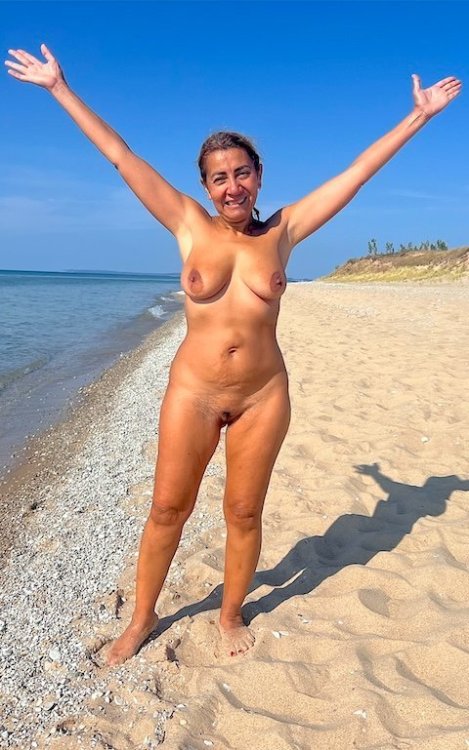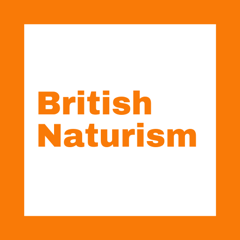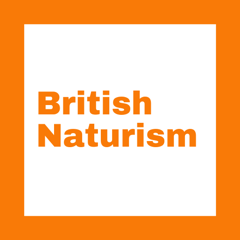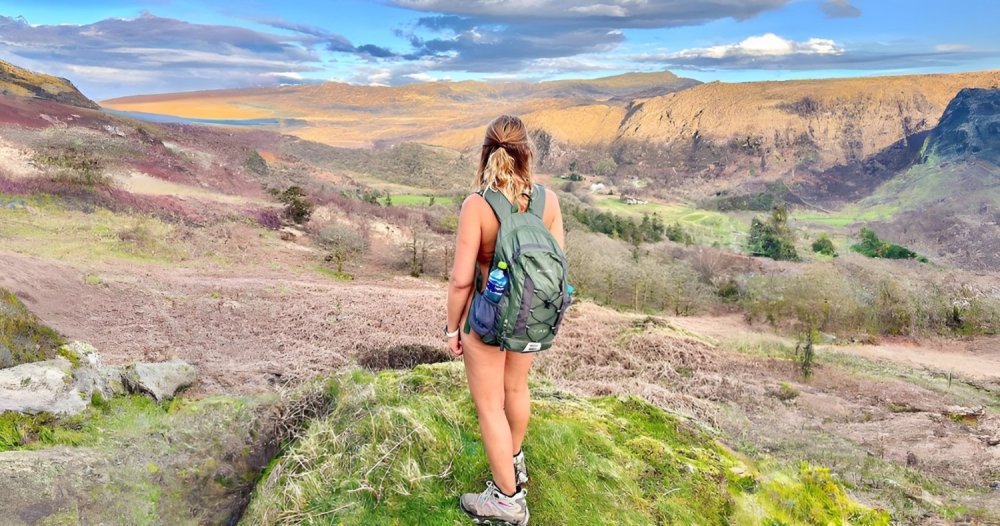 Vian is a 55 year old mum of 4 grown up children, and one cockapoo. She is a consultant gynaecologist and certified psychosexual counsellor, originally from the Middle East living and working in the United Kingdom since 2010.
Vian is a 55 year old mum of 4 grown up children, and one cockapoo. She is a consultant gynaecologist and certified psychosexual counsellor, originally from the Middle East living and working in the United Kingdom since 2010.
Q: What got you into naturism/nudism?
A: Following my postgraduate study of a professional certificate in psychosexual counselling in 2022, I started talking about body positivity and sexuality. I got many followers from the Arabic world on multiple platforms to talk about creating a non judgmental environment and accepting the diversity of people whatever their gender, body shape and sexuality. A couple of naturist friends in Egypt suggested I try naturism. On a trip to celebrate our birthdays with some female friends we tried being topless on a busy clothed beach in Rhodes. I noticed nobody has criticised our half naked bodies. The sense of freedom and liberation from societal norms and constraints was an incredible feeling. Shedding clothes can feel like shedding the pressures and expectations of everyday life. Following my return to the UK I visited one of the beaches to explore naturism for myself. This exploration was motivated by my desire to try something new and to break out of my comfort zone so I did my first skinny dip on my own. Naturism gave me a close connection with nature. Being nude outdoors, whether on a beach, in a forest, or at a naturist resort, enhances the feeling of being at one with the natural world.
Q: Is there a difference between the two labels?
A: While there are historical and cultural distinctions between naturism and nudism, the terms are often used interchangeably in modern discourse. Naturism is a philosophy to promote the practice of social nudity and share values of body acceptance, respect, and equality. Whether someone identifies as a naturist or nudist often depends on personal preference and cultural context. Nudism typically focuses more on the practice of social nudity for recreational purposes. I can describe myself as a naturist because naturism tends to emphasise a holistic lifestyle.
Q: How does it impact your life on a day-to-day basis?
A: Practising naturism has various impacts on my day-to-day life, both positive and challenging. It Improved my Body Image and Self-Esteem. I find physical comfort in being nude, especially in warm weather outside, or inside whenever possible. Being an active participant on social media, participating in promoting naturism created a sense of belonging and community. Shared experiences and the acceptance and respect with others built strong social bonds and deep friendships. By seeing a variety of body types and recognising the natural diversity of human bodies, I feel less pressured by societal beauty standards. Regular naked hiking and skinny dipping for example let me feel a stronger connection to nature when I am nude.
Q: What challenges do women face in naturism generally?
A: Being a woman raised in the Middle East, I was under the influence of body shaming from the society since my childhood, which made me a very shy person especially in my young adulthood. Women in general and in the Middle East specifically often face unique pressures and societal expectations regarding their bodies, influenced by cultural, religious, and social norms. Safety can be a significant concern for women in naturism, especially in public or less regulated areas. The potential for harassment or inappropriate behaviour from others can create anxiety. Women may face social stigma and misunderstanding about naturism, including misconceptions that it is inherently sexual or indecent. This can lead to judgement or criticism from family, friends, or the broader community. Some naturist groups may have a gender imbalance, with more men than women participating. This can create discomfort for some women although we all should feel safe.
Q: How can we encourage more women to try it?
A: Choosing Safe and reputable spaces like well-established and reputable naturist clubs, resorts, and communities that emphasise safety and respect. Nudefest from British Naturism is a good example. Connecting with other women in naturism can provide mutual support and create a more balanced and comfortable environment. Joining women-focused naturist groups or forums can be beneficial. Advocating for naturism and educating others about its principles can help reduce stigma and misconceptions. Sharing positive experiences of the non-sexual nature of naturism can further better understanding.
Q: How can women help in desexualising nudity?
A: Women can play a crucial role in desexualizing nudity through sharing their experiences with naturism and body positivity through blogs, social media, and public speaking. By highlighting the non-sexual aspects of nudity, they can help shift perceptions. We must learn that all body types are beautiful and natural so we shouldn’t conform to unrealistic standards as often portrayed in the media. Practising casual nudity at home can help desensitise children and others to the idea that the naked body is inherently sexual. Have open and honest conversations with friends, family, and partners about naturism and the non-sexual nature of nudity.
Q: What can men do to help in desexualising nudity?
A: Men can call out and critique media that sexualises nudity unnecessarily. By promoting media that depicts nudity in a non-sexual and natural context, they help shift public perceptions.
Q: How can we encourage body positivity and acceptance?
A: Offer workshops and events that focus on body image, self-esteem, and the impact of media on body perception. Educate people about the unrealistic beauty standards perpetuated by media and fashion industries by encouraging thoughts into how these standards affect self-esteem and body image. Encourage self-compassion by treating ourselves with kindness and understanding, especially regarding body image. Replace negative talk with affirmations and positive statements about out body.
Q: What advice would you offer to women curious about naturism?
A: For women curious about naturism, the journey into this lifestyle can be both exciting and empowering. I would suggest she starts slowly. Spend some time nude in the privacy of your home to get comfortable with your own body and how it feels to be free of clothes. I also found it helpful to read books, blogs and articles; there are many written by women naturists that provide insights and personal experiences. Look for naturist groups or clubs that focus on creating a safe and respectful environment for women. Many online forums and social media groups are dedicated to women naturists. Ensure the places you visit have positive reviews and a good reputation for safety and respect. Look for places that emphasise a family-friendly and inclusive atmosphere. If you’re nervous about going alone, consider going with a friend who is also interested in naturism. This can help you feel more comfortable and secure. Most of all know that naturism celebrates body diversity. Avoid comparing yourself to others and appreciate the uniqueness of every individual.
Q: What drives your passion in promoting naturism?
A: Promoting naturism is fueled by my desire to broaden body positivity, deepen connections with nature, experience personal freedom, and build supportive communities. Promoting naturism as a woman from the Middle East is both courageous and impactful. Challenging traditional norms and advocating for women's rights to choose how they present themselves, while encouraging other women to be themselves and inspiring others to explore naturism and its benefits, ultimately contributing to a more open and accepting society.
Q: Is your family supportive?
A: My partner, also a naturist, is so supportive and encourages me to reach higher levels and enjoy various activities in naturism. My children are supportive but not practising. I am the only person practising in my family.
Q: Has naturism changed since you first got involved?
A: I don't have long personal experience or extensive involvement in social naturism but naturism continues to evolve as a lifestyle choice that promotes body positivity, community, and a deeper connection with nature and others.
Q: How do you see the future of naturism?
A: The future of naturism is influenced by a complex interplay of societal, cultural, and environmental factors. While there are opportunities for growth and acceptance, naturism may also face challenges and obstacles along the way. As society becomes more open-minded and accepting of diverse lifestyles, naturism may continue to gain acceptance as a legitimate and respected way of living.
![]() Vian featured on episode 13 of the Women in Focus podcast. You can listen to her episode here.
Vian featured on episode 13 of the Women in Focus podcast. You can listen to her episode here.














